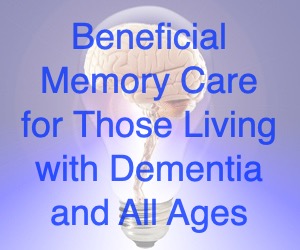Memory Cafe Directory posts and/or links to retailers can be advertising, sponsored, or affiliate links. We may earn a small commission from them. Thank you.
Guest Contributor: Michael Dehoyos
The term “Memory Care” is often associated with a special place for someone with memory loss. However, for today, it is the the type of activities in which we can participate to nurture, strengthen, and take the best possible care of ourselves to support a strong set of memories.
Whether it’s from age, illness or an incessantly busy lifestyle, it’s easy to forget important things throughout the day. Taking time to maintain or even improve your memory can decrease the likelihood of developing Dementia, slow the progress of such degenerative illnesses and lead to a calm, fulfilling daily routine for anyone.
In this article, we’ll take a practical look at the benefits of maintaining good memory in individuals living with Dementia, discuss the benefits of engaging memory of young and old people, then look at some simple ways to bolster memory that are fun to do at home or with friends.
Dementia and The Importance of Memory Care
Those living with Dementia or other degenerative brain illnesses struggle to recall people and events, lose the ability to perform tasks, and easily become frustrated with themselves. Getting involved with strengthening old memories and creating new ones not only renews your bonds with aging family members, but creates new ways to experience the love and closeness you both sorely miss.
Additionally, continuing to encourage memory recollection will stimulate the brain, strengthen neural pathways and potentially slow the progress of brain degeneration and memory loss seen in cases of Dementia. Nurses and family members can engage in these activities to reduce the loss of important family memories, slow the loss of grey matter, and keep those living with dementia and family members happy and capable of doing the things they love.
An Active Mind: Using The Senses
Engaging more than just one sense is the key to keeping neural pathways strong and healthy. There are a few ways to do this, while in some cases it may not be possible, but below are a few easy and interactive ways to stimulate the mind and senses of those suffering from Dementia.
These activities can also benefit younger audiences, as they increase the active use of senses to build new memories and recall old ones, increase health and happiness and encourage using the body as a whole to bolster innate memory. Try some of these at home if you want to boost your own memory capabilities and reduce potential stress in your daily routine:
Take A Stroll Somewhere Familiar… or New
There’s little better for the mind and spirit than some fresh air. Take a walk through a local park, an old neighbourhood or up to the local coffee shop and relive memorable events that occurred in life along the way. Engage your senses – sight, smell, hearing and physical activity – to enjoy a walk on a deeper level while letting familiar sights and scents stimulate your mind.
Taking an elderly relative or friend living with Dementia on a walk can invigorate their memory, build new memories or simply bring some joy and light exercise to their life, which is always a health benefit. Discuss what you see and smell with them, the colours in the flowers or the feel of the sun on your skin to encourage them to appreciate it too.
Get Cookin’ on Memory Care
Making food is something we do every day, so make it a family event and build some memories in an effortless and natural way. The scent of food and spices, heat of the kitchen and the taste of familiar dishes can trigger recollections can all reactivate neural pathways and memories you didn’t realise were there, or create new ones while you enjoy yourself.
For the elderly struggling with memory, you can focus on favourite tastes and smells, special family treats and recipes, or make something completely new to enjoy together. The sight and smell of foods will ignite their minds and help keep them living in the moment.
Pull Down the Photo Albums
Go through old albums and recall the good times you’ve had, strengthen your memory of times passed and build new memories. You can even make up stories for the pictures, if the memories are difficult to recall. Even if it’s not the true story behind the picture, having something fun or interesting to remember can make new memories stick and aid in memory retention.
“Embarrassing baby photos aside, looking back on times gone by and learning about old family is a great way to bond, build new memories and recall the past,” says Karen Hilton, a writer at Britstudent and PhD Kingdom.
Find Your Voice and Sing
It doesn’t matter if you’re out of tune; songs can jog memories you’d forgotten, bring emotions to the fore and renew bonds with loved ones. Find an old favourite, a first dance at a wedding or even nursery rhyme you’d sing together as children and warm up your vocal chords. It’s free, simple and a fun way to remember old times while creating new memories.
“Words and rhythm hold as much memory as sight and taste; it’s about using the senses to get those neurons firing,” says Anabelle Kind, a health writer at 1day2write and Writemyx.
Get Crafty with a DIY Memory Box
Gather your favourite scents, textures, toys or even magazine articles and outfits and put them in a memory box, which you can come back to anytime you want to add or relive a memory. It’s a great way to express yourself, keep your treasured memories safe and rekindle a love for old hobbies or entertainment, or build one together for bonding fun. It can be as complex as favourite puzzles and toys, or consist of simple shapes and colours; so long as they bring joy, the memory box is a success.
Keeping In Touch With Hobbies
As time passes and Dementia worsens, patients may become unable to carry out pass times or skills they once loved. It’s important where possible to tailor activities to the patient, as this can continue to stimulate degenerating pathways and slow the loss of these important personality characteristics.
Here are some simple ways to scale down activities to accommodate loss of ability in Dementia patients and family members, which will reduce frustration and stress in their lives:
Music loversmay love to watch others play or listen to music. Try favourite genres, an abstract version such as listening to the birds outside or nature tracks on the stereo, or let a relative get creative with a simpler instrument like a xylophone or tambourine while you sing along.
Reading enthusiastsmay enjoy reading along with you with the book in hand, being read to, or picture books that tell a story. Make your own stories with photographs, hand drawn pictures or about their daily routine to add some familiarity and individuality.
Outdoor adventurersmay love going for walks, sitting in the fresh air and sunshine or being if too frail to walk, pushed around the local park. Detour to interesting sights – fountains and play areas, or local sports grounds – for some added excitement and talk about what you see.
Sports loversmay want to engage in low-impact sports like golf or boules, enjoy watching others play live or on television and enjoy board games, tic tac toe or snap. Try to learn new games or relive old favourites where possible to encourage recall and retention.
Memory can be difficult to understand and even more troubling to see a loved one lose, so be sure to exercise your own regularly and help elderly relatives maintain theirs with these fun and simple ways to manage Beneficial Memory Care for Those Living with Dementia and All Ages.
Michael Dehoyos

Michael Dehoyos
A health writer at Next Coursework and Write My Research Paper, Michael Dehoyos assists companies in their marketing strategy concepts. He also writes for Origin Writings and contributes to many online publications, including magazines.
Become a Contributor!
 Do you want to be a Memory Cafe Directory contributor? If you have helpful information to share with our community, read about the guidelines, then get in touch to discuss what you have to offer.
Do you want to be a Memory Cafe Directory contributor? If you have helpful information to share with our community, read about the guidelines, then get in touch to discuss what you have to offer.
Thank you.




